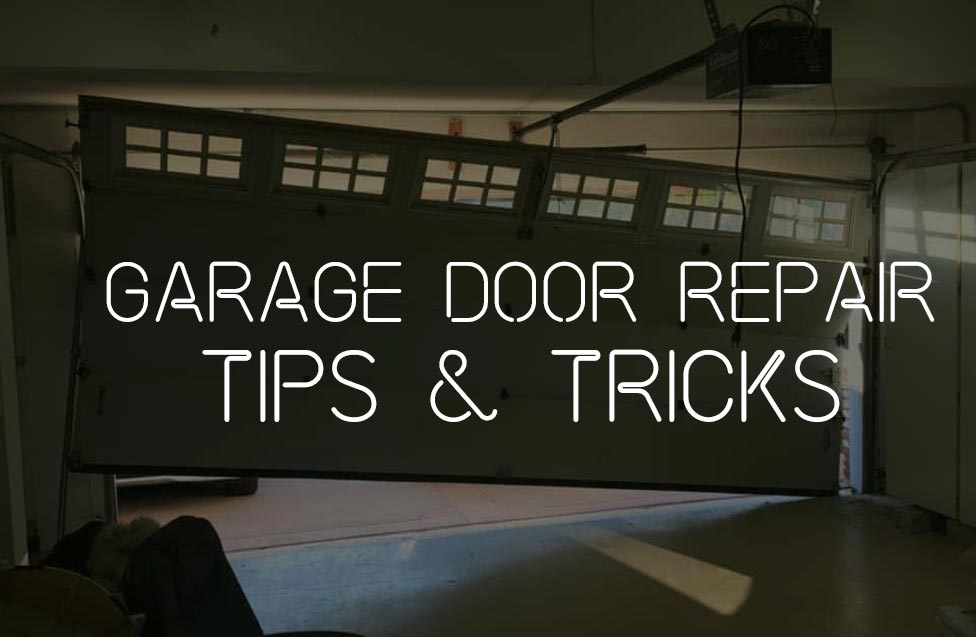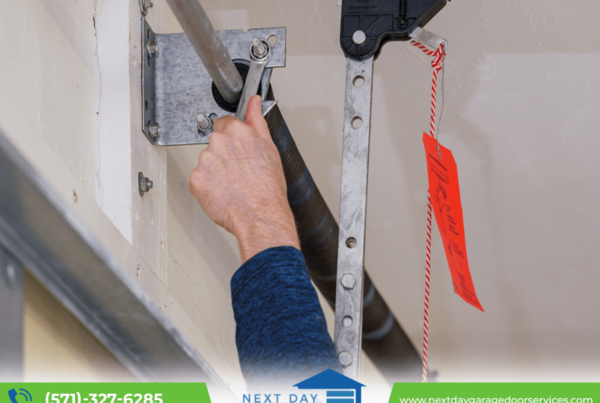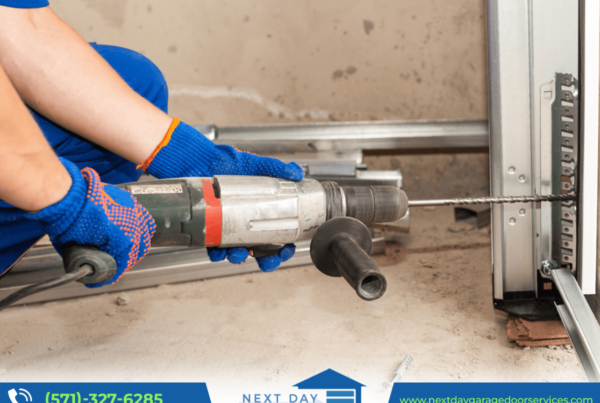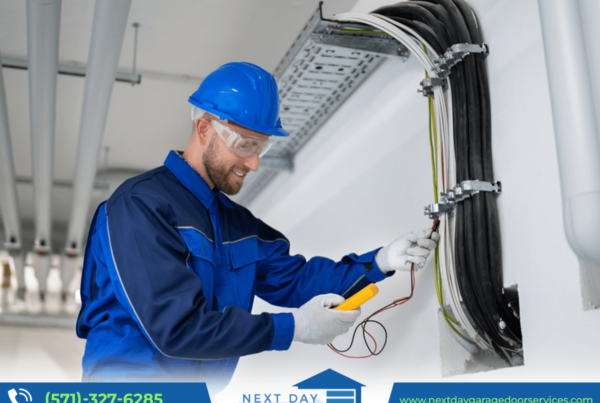Are you looking for a garage door repair in Alexandria VA or a garage door repair in Arlington VA? Do you need a rolling gate steel garage door installed in Washington DC? Look no further than Next Day Garage Door, a garage door repair company that prides itself on expert professionals and top-notch service. We’ve been in the business for over 10 years, and we’re hoping to help out homeowners that are struggling with common garage door repair or installation issues. Our goal is to ensure that all our potential customers are well-informed homeowners so that they can make both intuitive decisions and understand the value of their selections.
If you are thinking about investing in a new garage doors for your home, then you may be overwhelmed with all the terminology you are seeing. In today’s digital age it is easy to find a wealth of information – but if that information cannot be put into context it is essentially useless. Today we are going to provide some tips and advice on common garage door problems that residential homes may encounter. As always, Next Day Garage Door has technicians standing by 24/7 to answer all your questions and inquiries: Please feel free to call/text us at 301-500-0475 or 571-327-6285 for assistance.
GARAGE DOOR IS SO LOUD AND SQUEAKY
There are many proven reasons why your garage door squeaks. By knowing what they are, you’ll be able to rectify the squeaking problems quickly and inexpensively.
Out Of Alignment: One of the primary reasons why a garage door squeaks is because whether it’s brand new or many years old, all of the moving parts were incorrectly installed or became worn which causes misalignment. If a garage door is not perfectly aligned, then metal parts are going to abnormally rub against other metal parts, which will inevitably result in constant squeakiness. The solution is to have a garage door specialist professionally re-align the entire garage door with all of its moving metal mounting hardware.
Warped Wheels & Rollers: If your garage wheels are dented, bent or warped, the door is going to go up and down in a skewed direction causing immense metal-to-metal friction along the way. This will always result in enormous and constant squeaking. Fix this issue by having a garage door installation company like Next Day Garage Door to come out and replace the warped wheels and rollers.
Broken Track: If any part of the track in which the wheels travel through is broken, cracked, splintered or has pitted and pockmarked, metallic gouges in it from overuse, this will cause inevitable squeaking noises. You can have the track either repaired or replaced, depending on how severely damaged it is, and how much you can afford to spend. Sometimes a repair will be cheaper than an entire track replacement.
Stuck Debris: If any type of unwanted debris such as dead bugs, dried leaves, stones, pebbles, dirt, mud, sand or any hard, small objects are trapped and stuck in any part of the garage door system, including the track, rollers, chain, or frame, this will cause too much friction for the door to rise and lower smoothly and squeak-free. Use both your hands and a stiff bristled broom to remove all the wedged-in debris, and that will stop your squeaking problems.
Malfunctioning Chain: When the chain malfunctions, it’s usually because it’s either drooping or too slack, or just the opposite (too tight), or one or more of the links are missing or broken. The remedy is to have the chain professionally diagnosed. If nothing is visually wrong with the chain, but you suspect it might be the chain that’s causing the squeaking because you ruled out all of the aforementioned issues, then simply solve the squeaky chain problem by applying some garage door grease, silicone spray lube, or even candle wax along the entire chain and inside the track.
Rusted Nuts, Bolts & Hinges: If there are any rusted or stuck nuts and bolts along any part of the frame or track or chain, use some lube in spray or grease form as well, which will stop this particularly common reason for the squeaking of so many garage doors.
HOW/WHY DID MY SPRINGS SNAP?
Your garage door springs pretty much do all of the hard work when it comes to your door opening and closing. Garage door springs breaking is a perplexing problem for many homeowners who do not know what exactly how garage door springs work, how to fix them, or what causes them to break – all of which is valuable knowledge to have before you end up late to work because you couldn’t get your car out of the garage. There are two types of springs that are possibly prevalent in your garage door.
Extension spring systems are mounted on either side of the garage door track. They extend and contract with the assistance of cables and pulleys when the door is in motion. Torsion spring systems typically uses one or two (depending on door size) tightly wound springs. The springs are located horizontally on a steel shaft and have cable drums at both ends. The torsion spring is mounted to the header wall above the garage door. Most commonly it has a three-pronged support system with a center and two end bearing plates at either end.
Regardless of the type, your garage springs are responsible for helping the door raise and lower. When the garage door is lowered, the springs gain tension. When raising the garage door, tension is released and the spring assists with the lifting. It’s important to note, your garage door springs have most tension when the garage door is in the closed position. As a result, most garage door springs break when the door is down. In the occasional instance when the spring breaks while the door is in the open position, the door may come crashing down. This is why it’s important to never walk under an operating door.
Wear and Tear: By far the biggest reason for garage door spring failure is simple wear and tear. Most springs are engineered and rated for about 10,000 cycles – one cycle being the garage door going up and coming back down to close. That may seem like a lot, but consider that you go through a minimum of two cycles a day just getting the car out of and back into the garage. If you go on any errands, a spouse goes to work through the same garage, or kids open and close the door for any reason, those daily cycles can add up a lot faster than you may think. If you garage door has become your “front door” and receives excessive use, it might be smart to consider getting extended lifespan torsion springs, which are rated for 20,000 or more cycles.
Rust: If any rust develops on the spring for any reason, its lifespan will be dramatically shortened. Rust increases the amount of friction on the coils while it moves back and forth. Addition, the corrosion on the spring itself will weaken the coils and lead to failure more quickly. Spraying down the spring with a silicone-based lubricant three or four times a year can greatly assist in keeping it well lubricated and extend its life expectancy. Next Day Garage Door offers a garage door tune up with EVERY service as well as an independent service. For any garage door repair estimates, please give Next Day Garage Door a call at (571)-327-6285 or (301)-500-0475.
Improper Maintenance: All garage door springs will fail eventually, but proper maintenance can not only prolong the lifespan of the springs, but alert you when they are getting close to failure. The can help prevent potentially destructive explosive breaking of the spring as well as the headache involved with fixing it as quickly as possible. In addition to lubricating the spring with white lithium grease a few times a year, check the garage door balance at least once a season, especially in the winter when most springs fail. To check balance:
We highly advise broken garage door spring repairs be performed by professional technicians who possess the proper training and tools to complete the job safety. At Next Day Garage Door, we have expert professionals service your garage door to ensure that your garage door is safe, sound, and properly function.
GARAGE DOOR SENSORS
Because of safety issues, the federal government mandated companies that produce garage door openers to install safety devices in order to prevent accidents. Since the law was introduced in the early 1990’s, all garage door openers have implemented door sensors in order to be in compliance with federal regulations.
Although garage door sensors are nearly ubiquitous, many people still don’t how they work. The main function of the photo eyes is to ensure that there is not anything blocking the path of the door when it is closing. In order for the door to continue closing, the photo eyes must “see each other”, which is a loose way of saying that the ray of the infra-red beam that connects the photo eyes to each other remains uninterrupted. If that ray has been interrupted, the garage door will reverse, opening instead of closing.
Garage door openers can be opened with a remote control, which activates the motorized trolley. While some buttons on garage door openers are wired to the house, others are remote powered, so that you can open your garage door while still in your car. However, most modern garage door openers combine the two technologies for the sake of convenience, allowing you the ability to use both features.
The system employs an infra-red radio signal, which activates the electric motor once the button is pressed on your remote. In turn the electric motor engages a track-and-pulley system, which then opens or closes your garage door. The infra-red sensors that facilitate your garage door opening system are placed on either side of your garage door/doors, and they stand approximately six inches off of the ground. If, for some reason, the sensors are malfunctioning, one of the sensor lights will start to blink.
Check to see if there are any obstructions as this can be the cause of the malfunction. If the garage doorway is clear, you may need to either clean the lens or realign the sensor/sensors. If all of these options fail, contact Next Day Garage Door to help diagnose and resolve the problem.
SHOULD YOU ATTEMPT A REPAIR YOURSELF?
- If the door does not close all of the way or continually returns to open, make sure there is nothing blocking the safety sensors. The sensors are located about 6 inches off the ground on either side of the garage door.
- Check to see if the circuit breaker has been tripped. Your garage door opener can’t work without electricity and a tripped circuit breaker is sometimes the problem.
- Make sure the garage door isn’t locked. A garage door that has been manually locked will not open when you try to use the electric garage door opener.
If none of these simple solutions solves your problem, look to see if the door has come off of the tracks. Part of the track system may have become bent or something could be stuck in the track. Next, inspect the garage door opener chain or belt. The chain or belt might be broken.
See if you are able to move the garage door up and down easily manually. If the door feels heavy, it’s possible that you have a broken spring. This repair should only be performed by a trained professional with the proper tools and training. If the track is clear, the sensors are free from anything blocking them and the circuit breaker is reset, and the chain or belt are not broken, it might be time to call in a professional. If the motor has gone bad and needs replacement, Next Day Garage Door can repair your garage door opener repair in a timely fashion. It’s always a good idea to check for the simple things before calling a professional. As you assess the situation, look for the easier fixes first to avoid unnecessary repair costs.
At Next Day Garage Door, we promise to provide the very best service possible and offer a myriad of affordable options to help you make the smartest choice possible. Our ultimate goal is for all our customers to be informed homeowners. As this blog progresses, we will continue to help homeowners diagnose and perhaps even fix their garage door repair on their own. We offer Garage Door Repair Maryland and Roll Up Garage Door Washington DC. We also serve Garage Door Repairs all over Washington, DC, Maryland, and Virginia. We have technicians available 24/7 to service any of your garage door repair needs. Garage Door Repair Cost can be high; however, we promise to offer professional top-notch garage door repairs at an affordable price guaranteed. Please feel free to give us a call or text at (301)-500-0475 or (571)-327-6285 if you have any questions or inquiries.




